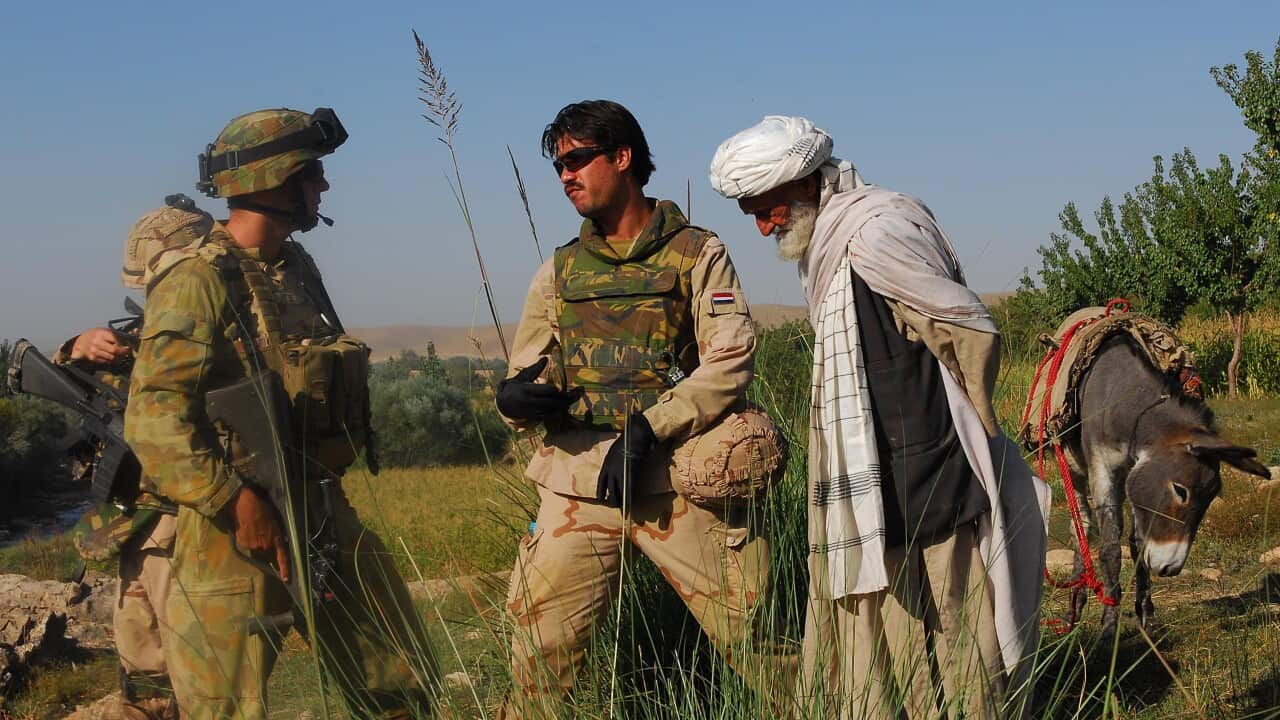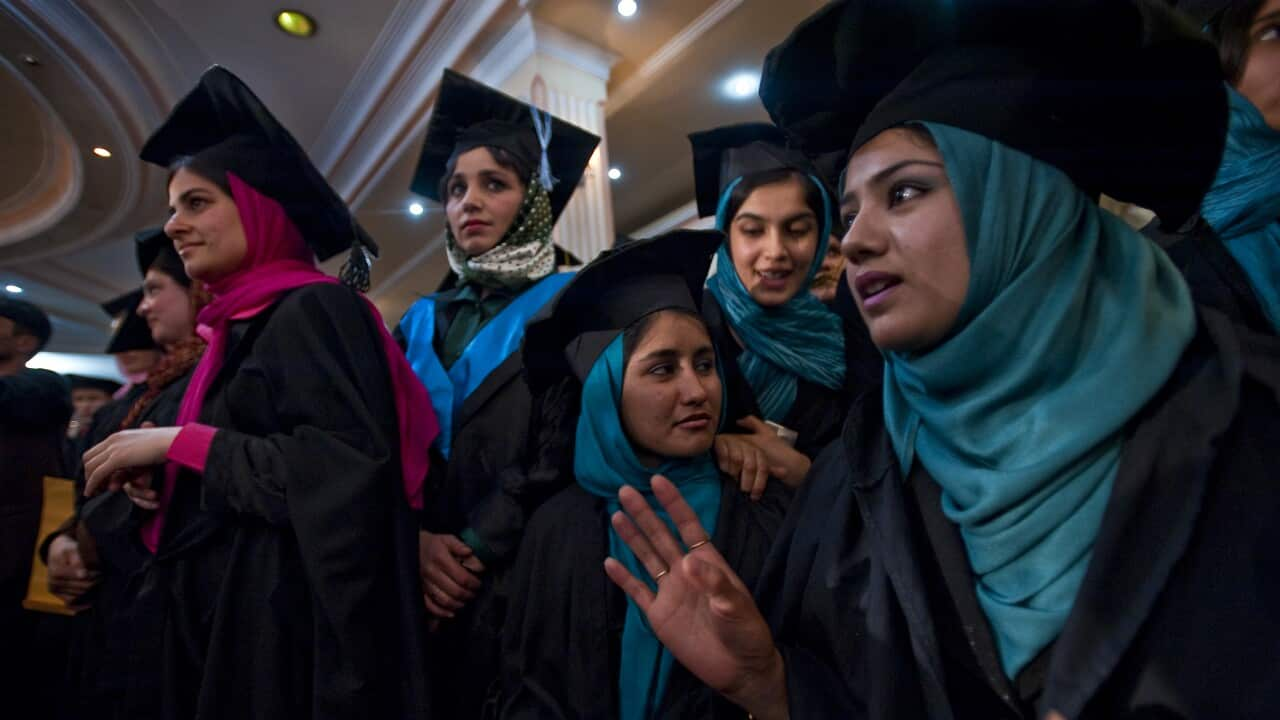KEY POINTS
- Since the fall of Kabul, more than 50,000 applicants for humanitarian visas have been rejected by the federal government.
- Some Afghan community members say this is 'disheartening' and have demanded the decisions be overturned.
- They claim family members remaining in Afghanistan are facing persecution and even death while others languish 'in limbo' in third countries including Pakistan.
Since the fall of Kabul in August 2021, approximately 208,000 Afghans have sought humanitarian and refugee visas for Australia to escape the Taliban regime.
However, more than 50,000 of these have had their applications for humanitarian visas refused by Australia while 144,000 other applications are pending.
Since the Taliban took over Afghanistan's political landscape, between 15 August 2021 and 31 August this year, 13,612 humanitarian visas have been granted to Afghan citizens under the offshore Humanitarian Program.
Afghan community members and former Afghan Locally Engaged Employees (LEEs) say they are "disheartened" with the high rate of rejection of humanitarian visas and are demanding the government reverse its decisions and grant the visas.
‘The Taliban killed my brother’
Ahmad* says he worked alongside Australian forces as an interpreter and cultural adviser in Uruzgan and Kandahar provinces between 2012 and 2013.
He arrived in Australia in 2014 and currently resides in Melbourne with his wife and children.
Ahmad* claims he submitted visa applications for his siblings and their family members about two years ago, but recently, two of his siblings received refusal letters from the Department of Home Affairs.

Ahmad* worked as an interpreter and adviser with the Australian Defence Force in Afghanistan. Credit: Ahmad*
“In May [2023], when my family moved to Pakistan, I submitted an online update [to the Department of Home Affairs] stating that my family was now in a third country. Despite providing this update, the applications were still rejected.”
He says that eight months after his own arrival in Australia, his brother, who was a police officer in Afghanistan, was killed by the Taliban.
He says he believes that his “work with the government” and with Australian forces “could be the reasons” behind his brother’s killing.

Rejection letter received by Ahmad's family member. Credit: Ahmad*
“This [decision] has left me disappointed. My entire family is concerned because when they left the country, people became aware that they had assistance (from) foreigners," he said.
For this reason, it would be virtually impossible for them to return and to live safely, he said.
“I have been sending emails to the Department but not receiving any positive responses and don’t know why," he said.
“Those who worked with them [the Australian government], their family members should be placed on the priority list and receive attention.”
‘Five applications refused in 24 hours’
Uzair Safi is the president of the Pastune Association of South Australia.
When the Australian government announced humanitarian visas for Afghanistan, he says he submitted dozens of applications for his family members and relatives.
However, he said he received “refusals for five applications” in a single day.

(L to R) Uzair Safi; Raz Mohammad; Australia's foreign minister Penny Wong; and Behista Anwar. Credit: Facebook / Raz Mohammad
“Those who rule there [in Afghanistan] are those who have guns. (It’s all about) the power of the gun, the gun is the law and you cannot ask for your rights,” he said.
“A certain group dominates. There is no government or system, which is why (our loved ones) are eligible for visas.
“This is our demand: that those people who have submitted the applications and are from Afghanistan, in considering the situation in Afghanistan, deserve to be accepted as refugees. Their cases should not be rejected.”
Mr Safi currently resides in Adelaide with his immediate family members, parents and siblings. His sister is the last member of their family remaining overseas. She's currently in Pakistan awaiting an Australian humanitarian visa.
“One day after the collapse, they [my sister’s family] moved to Pakistan and are still waiting,” he said.
“Twelve of her siblings are Australian citizens, and her parents are Australian citizens.
“About seven months ago, I took my parents with me [to a meeting with the immigration minister] and (they) told the minister in a roundtable that their daughter and her husband had been waiting for the last two years.”
‘Stop refusing and expedite the processing’
Afghan LEE Alliance president, Qutbiallam Timor, worked as a business adviser with AusAID in Afghanistan between 2012 and 2013.
In August, Mr Timor, along with two other former LEEs, Ahsanullah Sherzal and Mohammad Nazir Mangal, completed a 700km protest walk from Dandenong, Melbourne, to Canberra.
One of their demands was to “stop refusing in-country visa applications for Afghans” and “reconsider processing the recently-refused” visa applications.

Afghan Locally Engaged Employee (LEE) Alliance president, Qutbiallam Timor. Credit: Qutbiallam Timor
“Unfortunately, the Australian government neglects the humanitarian visa applications of vulnerable Afghans who are at imminent risk which ruins the credibility of the Australian government globally and among the Afghan community here in Australia.
“The Australian government should simply uphold their promise they made towards the vulnerable Afghans, particularly extended families of certified Afghan LEE, women and children, not only to stop refusing their visa application but to expedite the visa processing.”

Credit: Department of Home Affairs
‘Committed to a Humanitarian Program’
A spokesperson for the Department of Home Affairs told SBS Pashto that a total of 20,000 places had been allocated for humanitarian visas for the 2023-2024 financial year.
“Applicants who have been refused a visa can lodge a new application for a Refugee and Humanitarian visa,” the spokesperson said.
“A new application will be assessed on its individual merits, however the outcome is likely to be the same unless the applicant’s circumstances have changed or relevant and significant new information is provided.
"Australia’s Humanitarian Program is non-discriminatory and is aimed at assisting the most vulnerable, regardless of race, religion or ethnicity."
In addition to the 20,000 places, the Australian government was committed to supporting the Afghan community, with 16,500 places allocated for Afghan nationals under the Humanitarian Program, delivered over four years (4,125 places per year between 2022-23 to 2025-26).
“This is in addition to the 10,000 places for Afghan nationals within the offshore Humanitarian Program over four years from 2021-22 through to 2024-25,” the spokesperson said.
“Within the Humanitarian Program places for Afghan nationals, priority will be given to certified former Locally Engaged Employees (LEE) and their immediate family members.”
* Name changed due to safety concerns.




